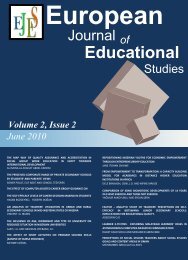methods and materials for religious education in adult education in ...
methods and materials for religious education in adult education in ...
methods and materials for religious education in adult education in ...
Create successful ePaper yourself
Turn your PDF publications into a flip-book with our unique Google optimized e-Paper software.
European Journal of Educational Studies 5(1), 2013<br />
An <strong>adult</strong> is usually def<strong>in</strong>ed as a fully grown person or who is considered to be legally responsible <strong>for</strong> his actions.<br />
(Om<strong>in</strong>yi <strong>and</strong> Opu, 2008) accord<strong>in</strong>g to Anyanwu (1997), an <strong>adult</strong> is one who shows a reasonable measure of maturity,<br />
controls himself, prudent, patient, tolerant <strong>and</strong> socially reasonable. This means that those whom are regarded as<br />
<strong>adult</strong>s are expected to show moral <strong>and</strong> emotional maturity. However, <strong>adult</strong>hood is not limited to physiological<br />
maturation alone, rather, <strong>adult</strong> is someone who has entered upon the responsibility of maturity (UNESCO, 1972).<br />
Based on this, which are associated with the state of be<strong>in</strong>g <strong>adult</strong> such as, self-direction, judgemental maturity <strong>and</strong> a<br />
sense of responsibility. Adults deserve to partake <strong>in</strong> decision which affect their own well-be<strong>in</strong>g <strong>and</strong> that of their<br />
community <strong>and</strong> society at large. They ought to participate <strong>in</strong> transmitt<strong>in</strong>g the benefits of culture <strong>and</strong> societal liv<strong>in</strong>g to<br />
the younger persons (Adekammbi <strong>and</strong> Modise, 2000). If <strong>adult</strong>s are seen <strong>in</strong> this way, they need to acquire sound<br />
<strong>education</strong> whether <strong>in</strong> <strong>adult</strong>hood or childhood. As <strong>education</strong> br<strong>in</strong>gs about the highest all-round development of<br />
persons, greater desirable fullness of personality, illiterate <strong>adult</strong> needs to be educated, especially<br />
<strong>religious</strong>ly.Follow<strong>in</strong>g from this, the concept of <strong>adult</strong> <strong>education</strong> needs, to be exam<strong>in</strong>ed.<br />
Adult <strong>education</strong>, accord<strong>in</strong>g to Smith (2002), <strong>in</strong> some countries is used <strong>in</strong> comprehensive manner to mean all facets of<br />
<strong>education</strong> <strong>for</strong> those who left primary <strong>and</strong> secondary schools, <strong>in</strong> other countries; it is used <strong>in</strong> restricted manner to<br />
mean basic literacy <strong>education</strong> <strong>for</strong> <strong>adult</strong>s. Based on this, Anowor, Ezema <strong>and</strong> Umezuruike (2001) ma<strong>in</strong>ta<strong>in</strong> that <strong>adult</strong><br />
<strong>education</strong> is by no means uni<strong>for</strong>mly or consistently def<strong>in</strong>ed throughout the world, because of its relationship with the<br />
social, political <strong>and</strong> cultural conditions of different countries. Def<strong>in</strong><strong>in</strong>g <strong>adult</strong> <strong>education</strong>, Makulu (1971) considers it<br />
to mean that all-<strong>in</strong>clusive pattern of <strong>adult</strong> development which has <strong>in</strong> view the need of the <strong>adult</strong> not only as an<br />
<strong>in</strong>dividual, but also as a member of his community, <strong>and</strong> which help him to live more effectively <strong>in</strong> his society. On<br />
the basis of this def<strong>in</strong>ition, Adult <strong>education</strong> <strong>in</strong>clude mass <strong>education</strong>, community development, vocational tra<strong>in</strong><strong>in</strong>g,<br />
basic literacy, youth activities, <strong>and</strong> <strong>for</strong>mal <strong>and</strong> non-<strong>for</strong>mal <strong>education</strong> aimed at tra<strong>in</strong><strong>in</strong>g the <strong>adult</strong> <strong>for</strong> his duties as a<br />
citizen of his state.<br />
Adult <strong>education</strong> may be organized <strong>in</strong> three modes:<br />
1. To tra<strong>in</strong> <strong>adult</strong>s to get a qualification (second chance, remedial <strong>education</strong>al)<br />
2. As a national mass <strong>education</strong> programme, such as the mass <strong>education</strong> programme, such as the mass literacy<br />
programme <strong>in</strong> Nigeria lead<strong>in</strong>g to any academic qualification.<br />
3. As a deliberate tra<strong>in</strong><strong>in</strong>g programme <strong>for</strong> <strong>adult</strong>s specific skills (Duke, 1982).<br />
In whatever mode we put <strong>adult</strong> <strong>education</strong>. It aim is promot<strong>in</strong>g mass literacy by avail<strong>in</strong>g all <strong>and</strong> sundry the<br />
opportunities to be educated. In other words, it is a <strong>for</strong>m of <strong>education</strong>, which is properly planned <strong>and</strong> methodically<br />
applied <strong>for</strong> the provision of remedial, cont<strong>in</strong>u<strong>in</strong>g <strong>and</strong> other aspects or <strong>for</strong>ms of <strong>education</strong> to <strong>adult</strong>s or adolescents<br />
outside the regular <strong>for</strong>mal <strong>education</strong> (Oka<strong>for</strong>, 1987).<br />
Adult leaner, <strong>in</strong> <strong>adult</strong> <strong>education</strong> study all the regular subjects of the regular students, <strong>in</strong>clud<strong>in</strong>g <strong>religious</strong> <strong>education</strong>.<br />
The teach<strong>in</strong>g of <strong>religious</strong> <strong>education</strong> <strong>in</strong> <strong>adult</strong> <strong>education</strong> calls <strong>for</strong> a critical question on methodology <strong>and</strong> material.<br />
Methods <strong>and</strong> <strong>materials</strong> are <strong>in</strong>tegral part of teach<strong>in</strong>g. The <strong>in</strong>fluence how well or how poorly a subject will be learned<br />
(Akubueze 1992). Deic<strong>in</strong>g appropriate method <strong>and</strong> adapt<strong>in</strong>g necessary <strong>materials</strong> <strong>in</strong> teach<strong>in</strong>g <strong>adult</strong>s are necessary<br />
because <strong>adult</strong> learners have peculiar characteristics. Accord<strong>in</strong>g Mirian (2000) Adult learners:<br />
i. Has <strong>in</strong>dependence self-concept <strong>and</strong> who direct his or her own learn<strong>in</strong>g;<br />
ii. Has accumulated a reservoir of life experiences that is a rich resource <strong>for</strong> learn<strong>in</strong>g;<br />
iii. Has learn<strong>in</strong>g need closely related to chang<strong>in</strong>g social roles.<br />
iv. Is problem centered <strong>and</strong> is <strong>in</strong>terested <strong>in</strong> immediate application of knowledge.<br />
v. Is motivated to learn by <strong>in</strong>ternal factors.<br />
The adequate knowledge of these traits which help the <strong>adult</strong> <strong>education</strong> apply appropriate <strong>and</strong>rology <strong>in</strong> the process of<br />
teach<strong>in</strong>g. The knowledge of some theories <strong>in</strong> <strong>adult</strong> <strong>education</strong> will also be of immense importance <strong>in</strong> choos<strong>in</strong>g the<br />
<strong>methods</strong> <strong>and</strong> <strong>materials</strong> relevant <strong>in</strong> teach<strong>in</strong>g the Adults. This is necessary because some of these theories do not only<br />
depict the attributes of <strong>adult</strong> learners but also silently po<strong>in</strong>ted out the <strong>methods</strong> <strong>and</strong> <strong>materials</strong> required at any stage of<br />
<strong>adult</strong> learn<strong>in</strong>g.<br />
Action learn<strong>in</strong>g theory, <strong>for</strong> example, accord<strong>in</strong>g to York (2000) po<strong>in</strong>ts out that classroom tra<strong>in</strong><strong>in</strong>g is <strong>in</strong>efficient <strong>in</strong><br />
<strong>adult</strong> learn<strong>in</strong>g. The reason is that half of the people <strong>in</strong> the classroom are secretly work<strong>in</strong>g on their “real jobs” half are<br />
so relieved not to be able do<strong>in</strong>g their real jobs, they„ve turned their m<strong>in</strong>d entirely off. Half already know half the stuff<br />
be<strong>in</strong>g taught <strong>and</strong> are play<strong>in</strong>g Buzzword B<strong>in</strong>go on their palms, half will never need to know more than half of it.<br />
Wade <strong>and</strong> Hammick (1999), advocate that action packed <strong>methods</strong> like project <strong>methods</strong> should be adopted to arrest<br />
the attention of the learners.<br />
124

















